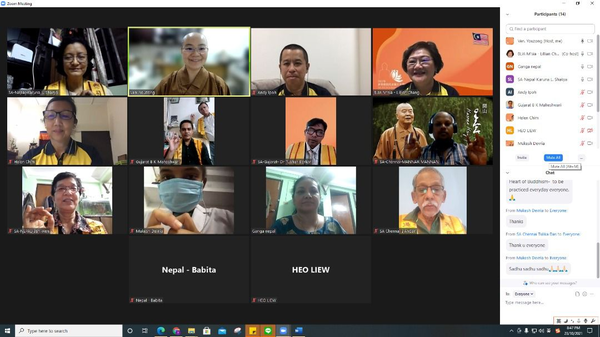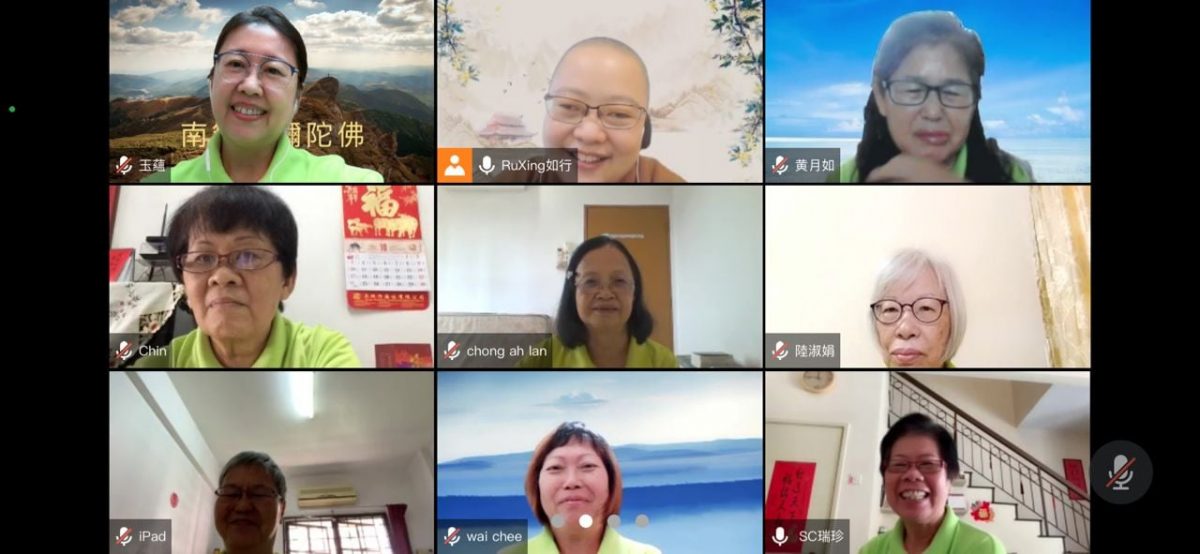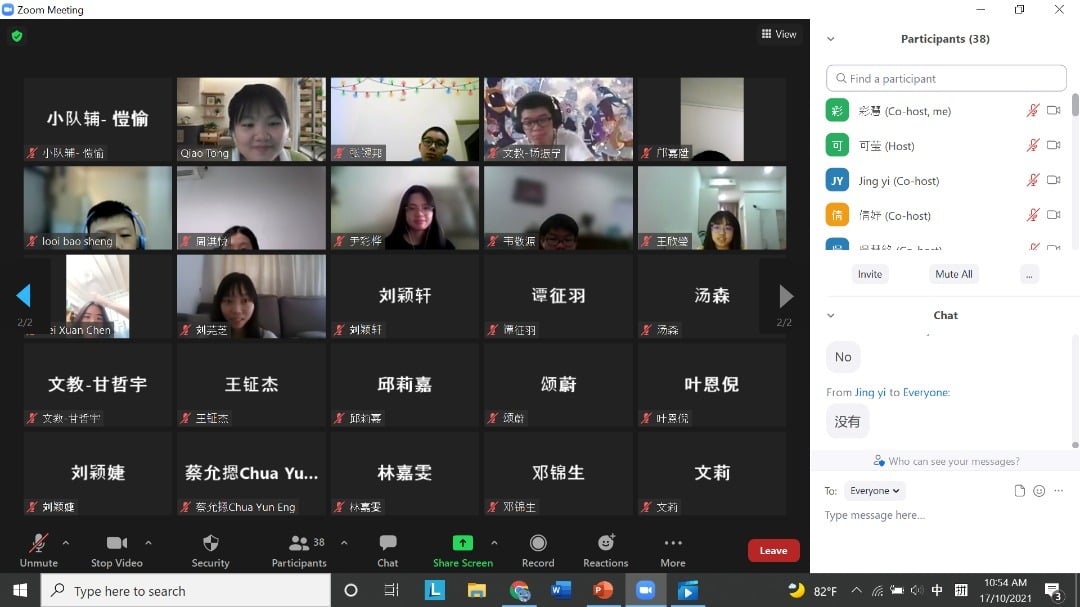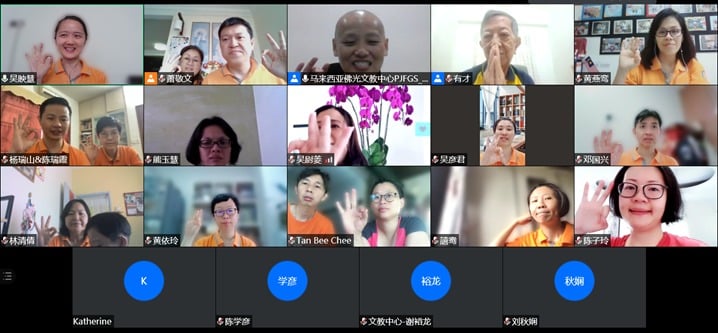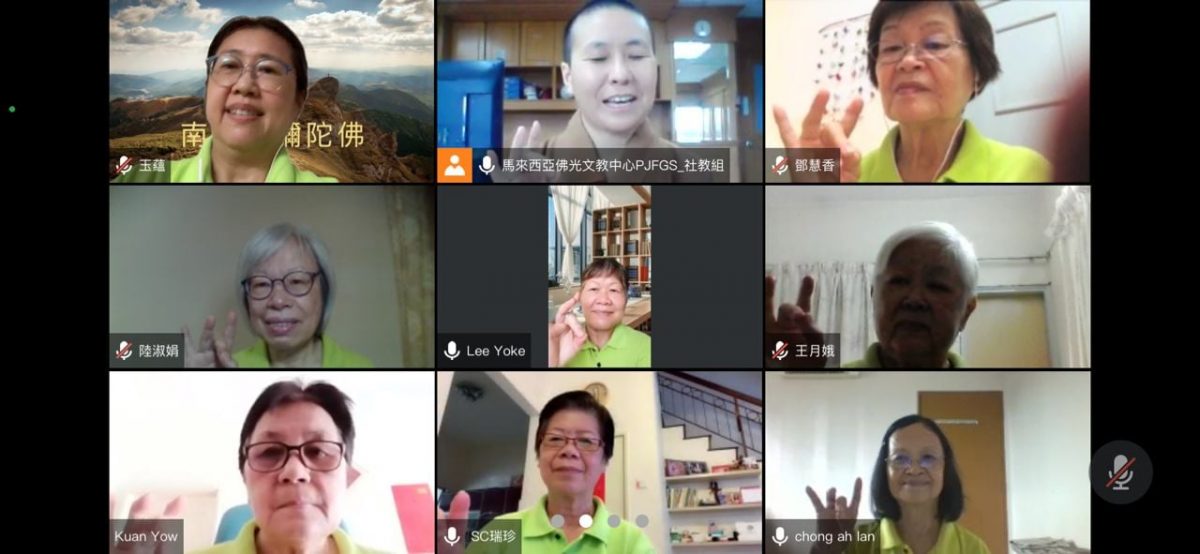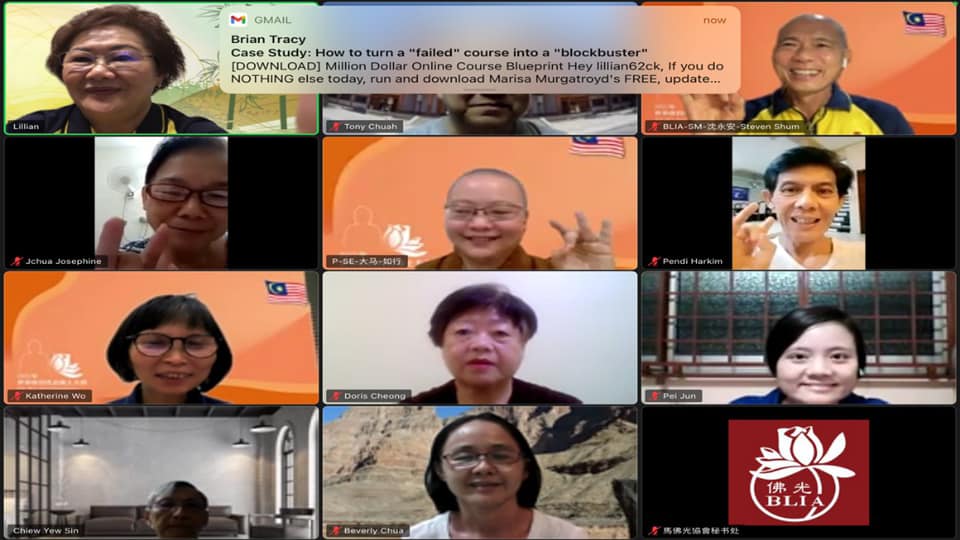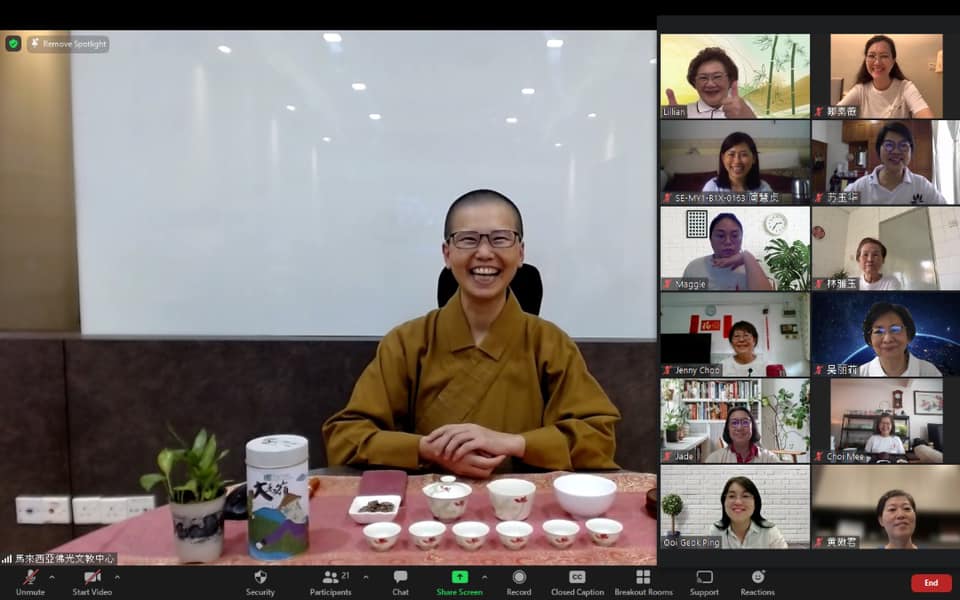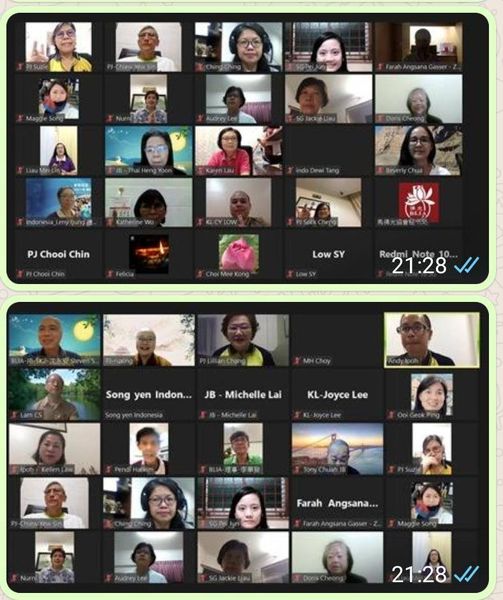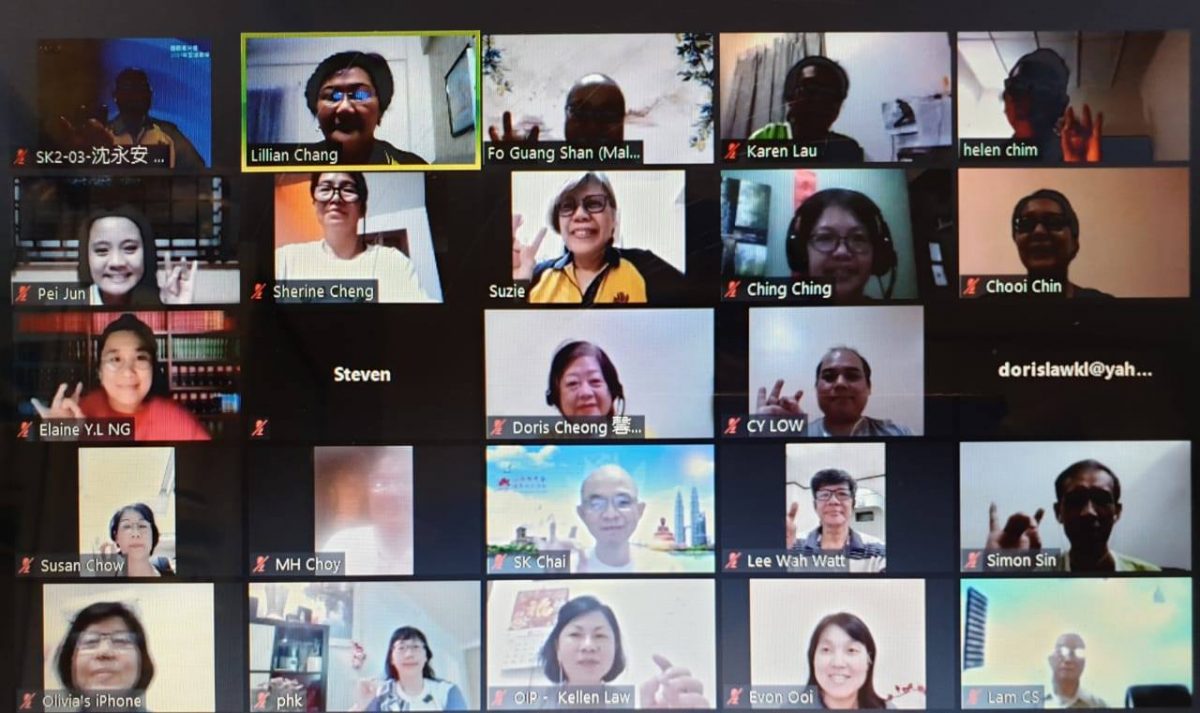Date: 23/10/2021 (Sat)
Time: 7.00pm-8.30pm (M’sia Time)
4.30pm-6.00pm (India Time)
Facilitator: *Ven. You Zong *
Topic: Buddha-Dharma: Pure & Simple —
Law of cause and effect across three times period
The topic started with reading of paragraphs by each one of the participants. At the end of the reading, ven. You Zong had put few questions for discussion to be the part of the topic. Which had explained very well by the participants as per their day today life experiences on law of causes and effects.
Question1 . what are common query people have regarding cause and effect?
Answered by Brother Mannan: common people think that if one person doing some wrong thing but he is giving happily, if a person living with pure heart and very simple but still he is in poverty are facing problems in a day today life. The questions are always there in their mind whether cause and effect really in theory or philosophy and these are the common queries in most of the people.
Question 2. Do your subchapter people face same problems?
As per Dr Karuna, The people think that whatever if one does good it comes back to good in life if one does bad then it comes back in later life, people believe that whatever they does good in the future.
Ven. You Zong added and shared her childhood experiences mentioned ‘’one reap what one sow’’ as per her mother but young generation always need to be explained and need to be proved.
Question 3. Which saying this describe the law of cause and effects and karmic retribution?
As per sis. Lilian present life experiences are the results of past life and present life cause of future life experiences.
Question 4 which example is this article explain cause and effect and karmic retribution example given by master?
Answered by Dr Karuna, example about the saving account every people committed crime but that is a kind of withdrawing from their own saving account.
Question 5. What is the world most just arbitrator?
Answered by sis Lillian is law of cause and effect is the arbitrator.
Question 6.if some one wish to changes the law of cause and effects over faith what one should do?
As per brother Mannan live in the present moment, and added by sis Lucy that to have remorse and try to live better life to have others to reach out people because our wholesome deed with compassion and with way we have others and helping ourselves better karmic results coming life.
Questions 7 share your experiences do you believe cause and effects? Give life experiences from your life that one reap what one sow that support law of cause and effects?
As per Mr Anban, by doing good deed, speaking good words and thinking good thoughts this is the example and ‘’golden words’’
Question 8 So, how you convince out of people?
As per Bro. Mannan by giving comparision between two students one study well and other not and how they get the result in their further life. He also added the example of public transport where offering a chair to the physically challenged and needy or lady with child where one can offer the help, during pandemic helping the people like sowing seeds without expectation and will get good reap in future.
Dr Karuna also added example and her experience while working with co-workers need a good environment by adding happiness, kindness and satisfaction which reflect hormony in the team and affect the life.
Ven.you Zong added that we work with the people and connected with lot of people, family and like working in a team so you give love, kind words, give smile which create hormony environment surrounding you.
Question 9 what is the effect of law of cause and effect and karmic retribution how do you explain ?
Answered by sis Lucy that no one can escape from one’s karma, evey deed and action accumulated for like how every you nurture and nourish your body and mind because everything is connected.the teaching of Dharma is available all around us but how we use it and understand make us who we pick up and virtue and wholesome deeds that nature becomes you. That why they say that we need to save water, plant, and free use of biodegradable things and don’t waste natural resources and revalue and deeds to save for later generations.so we need to take care of everything and are connected. Because with single kind words transforms a person life. So, everything like cause and effects and karmic retributions that we need to develop and nurture.
Question 10 we as a Buddhist always say live in the present moment so, what represent live in the present moment and is so important in three time period what do you think?
Answered by Mr Steven, Buddha always advices that as per the Dharma that we must live in the present, where the past is always a past and the future is not there whatever the present which is most important moment, In our life we also live in three time periods that we accumulated good that we do, so in present you are planting a lot of good seeds then you are looking good fruits in future. But the future is not yet here but present in how do you live. When there is lot of negativity around us we should be thankful as we are clearing our debts, so we should be thankful to negativity also and so we should see good. That’s the teaching of Buddha.
Question 11 do you believe to find challenging a single thought that turn sadness to happiness? How do you stop? Is it possible in single thought have face that? How much sadness it takes?
As per brother steven shared his experiences before coming to Buddhism always negativity in his mind, and as per him you can not let go but after learning Buddhism after practicing 4 universal vows that is
1) Sentient Beings are limitless, I vow to liberate them.
2) Afflictions are endless, I vow to eradicate them.
3) Teachings are infinite, I vow to learn them.
4) Buddhahood is supreme, I vow to attain it. ,
you apply in your family which find useful and you thanks causes and condition when let it go. Everyday need to practice and meditation so that good habit that we develop our mind. And our daily challenges we are able to turn negative to positive.
Ven. You Zong added, your practices and you make habit , you practice, you make compassion then you let it go every easily. Everyone have Buddha nature inside you. In the begining its looks difficult but if you believes in yourselves keep doing it, repeat it make it a habit. Then you will find everything in the present moment would transform into a lot of negativity in to positivity.
Question12 while facing life challenges do you have lucky escape? Which seems like contradiction? Do you believe in lucky escape?
As per bro. B.k. Maheshwary. That I believe that nature of law is supreme and you can escape this moment but the next moment result will there as what I have done my karma earlier. If tomorrow I will be waiting then it will come with interest.so , I don’t believe that any one can escape from the laws of cause and effect every one has to pass though 100%. I can not escape from the law of nature.
Ven. You Zong added yes there is no escape at present moment, put in positive mind if it happen tomorrow one day to change law of cause and condition with right view face with positive mind.
Question13 how does the cause and effect the article across the three time period help you in your life?
As per Madam Ganga, by giving example of when we throw a black ball , black ball return when we throw white ball return white ball is the example of cause and effect.
Dr Tushar added, the cause and effect its purifying our mind and it keeps opening our mind that we should be focused we should keep on doing the good work, wholesome deeds should be continued , common people they get bad karmic result after doing good deed. We should keep doing good work, even we should encourage other also for not to worry of bad karmic out put but to keep continue positively in the life. Be more optimistic, hopeful for the future, its keep up moving ahead and it giving us fearlessness work and keep doing our great work.
Another sister added, we should speak good words with mind do good deed, speak good word and think good thought that that is the good karma.
Mr Anban added, the cause and effect are the heart of Buddhism the hear teaching of Buddhism. So, everyone should practice, so this is our life not only for Buddhism but for everyone whole world this is the formula.
Brother mannan thanked for sharing life experience working place and many people. And about interaction session about the fearless life while practicing Buddhism and law of cause and effect.
Ven. You Zong added her temple experience, that lot of people in south Asia people they pray to the Buddha or bodhisattvas during the Chinese new year, they bring apples to the Buddha they want to pray for safety of family they want to pray for prosperity. Common people they don’t graps the meaning they take like insurance that if Buddha bless me good happen to me these belief don’t work that happen to your surrounding to you, same thing bad happened so they blame Buddha . they think religion don’t work they need to change . how it happen to my son, my next generation. I think this is up to the superstitious.
Mr. Steven added a business man story who was chanting Buddha and loss money in share market, where a beside standing venerable asked that he chanted Buddha name amitofo as insurance but this is mistake, it could be want to reborn in pureland. But the mistake the karmic happening between the Buddha name and doing business when you do business you mixed up karmic happening.
Ven. Youzong added that lots of people loss the faith due to bad things happened. Because the fundamental law of Buddhism. We are extremely lucky who keep emphasizing on Buddhism.
At the end of the class merits were distributed by Ven You Zong.
Study Group of South Asia
